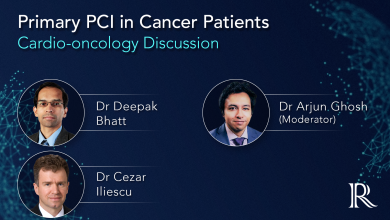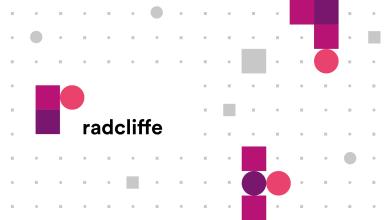Search results
PROMOTED
Author(s):
Nicolas M Van Mieghem
,
Kendra J Grubb
,
David Hildick-Smith
,
et al
Start date:
Mar 26, 2024
Author(s):
Arjun K Ghosh
,
Deepak L Bhatt
,
Cezar Iliescu
Added:
2 years ago
Cardio-oncology topic editor, Dr Arjun Ghosh (University College London Hospital and Hatter Cardiovascular Institute, UK) is joined by Dr. Deepak L. Bhatt (Brigham and Women's Hospital, Medical School, US) and Dr Cezar Iliescu(The University of Texas MD Anderson Cancer Center, US) to discuss interventional issues in cancer patients with a focus on patients with acute coronary syndromes (ACS)…
View more
Author(s):
Kelvin Chan
,
Stephen W Lee
Added:
3 years ago
The capabilities of OCT provide cardiologists with an effective tool for the assessment of patients with acute coronary syndrome (ACS), and permit new insights into plaque progression and ruptures. ACS is typically a life-threatening presentation of atherosclerosis. The in-depth lesion evaluation of OCT is invaluable and has enabled the pathophysiology of ACS to be fully unveiled.2
Acute…
View more
Added:
3 years ago
16 May 2017, Paris, France
Low risk with deferred revascularisation based on measures of intracoronary physiology
Largest real-world dataset reports on deferred revascularisation in stable angina and ACS
Deferring revascularisation based on measures of intracoronary physiology using either instantaneous wave-free ratio (iFR) or fractional flow reserve (FFR) is associated with a low risk of major…
View more
Added:
3 years ago
Results from LEADERS FREE sub-study in acute coronary syndromes report for the first time
Paris, France 17 May 2016: Patients with acute coronary syndromes (ACS) who are at high risk for bleeding have significantly lower rates of target lesion revascularisation and fewer adverse events after undergoing percutaneous coronary intervention (PCI) with a polymer-free biolimus-A (BA9) drug-coated…
View more
Added:
3 years ago
Vienna, Austria – 17 October 2015: Infections in childhood are associated with an increased risk of early heart attacks, according to research presented today at Acute Cardiovascular Care 2015 by Dr Andriany Qanitha, a PhD candidate at the Academic Medical Centre in Amsterdam, the Netherlands.1 Unhealthy lifestyles in adulthood appear to compound the risk of early heart attack.
“Cardiovascular…
View more
Author(s):
Sasha Koul
,
David Erlinge
Added:
3 years ago
Acute coronary syndromes (ACS) are a major reason for death and morbidity in the industrialised world. One of the most successful treatments for ACS has been strategies to target the platelets and inhibit their function.
Mechanisms of Platelet Activation
Thrombus formation in the arteries is dependent on platelets and their ability to attach to the injured wall despite the rapid arterial blood…
View more
Author(s):
Abelardo Martinez
,
Sandy Green
,
James L Januzzi
Added:
3 years ago
Previously considered to be separate disease entities, the acute coronary syndromes (ACS) are somewhat arbitrarily divided on the basis of their electrocardiographic manifestations and are now thought to arise from a common disease process. Based on a number of factors, the severity of the ACS and, consequently, their attendant clinical risk may vary. The management of patients with ACS should…
View more
Author(s):
Abelardo Martinez
,
Sandy Green
,
James L Januzzi
Added:
3 years ago
Previously considered to be separate disease entities, the acute coronary syndromes (ACS) are somewhat arbitrarily divided on the basis of their electrocardiographic manifestations and are now thought to arise from a common disease process. Based on a number of factors, the severity of the ACS and, consequently, their attendant clinical risk may vary. The management of patients with ACS should…
View more
Author(s):
Darshni Arishta Jhagroe
,
Jur ten Berg
Added:
3 years ago
Dual antiplatelet therapy (DAPT) is indicated in patients who need to undergo percutaneous coronary intervention (PCI) procedures.1 Compared with oral anticoagulation (OAC) and aspirin, DAPT has been shown to reduce the risk of thrombotic events and the rate of bleeding events.2 Chronic OAC is required in up to 10 % of the patients undergoing PCI, and is usually indicated for AF and mechanical…
View more












